| Listing 1 - 8 of 8 |
Sort by
|
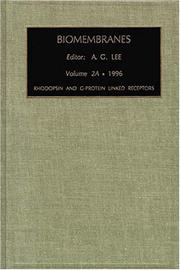
ISBN: 9781559386593 1559386592 0080540589 Year: 1995 Publisher: Greenwich, Conn. : JAI Press,
Abstract | Keywords | Export | Availability | Bookmark
 Loading...
Loading...Choose an application
- Reference Manager
- EndNote
- RefWorks (Direct export to RefWorks)
The quantity of information available about membrane proteins is now too large for any one person to be familiar with anything but a very small part of the primary literature. A series of volumes concentrating on molecular aspects of biological membranes therefore seems timely. The hope is that, when complete, these volumes will provide a convenient introduction to the study of a wide range of membrane functions. Application of the techniques of molecular biology has provided the sequences of a very large number of membrane proteins, and has led to the discovery of superfamilies of membran
Biological transport. --- Carrier proteins. --- Membrane proteins. --- Membranes (Biology). --- Membranes (Biology)
Book
Abstract | Keywords | Export | Availability | Bookmark
 Loading...
Loading...Choose an application
- Reference Manager
- EndNote
- RefWorks (Direct export to RefWorks)
ANTIGENS, CD --- HISTOCOMPATIBILITY ANTIGENS --- MEMBRANE PROTEINS --- MATERNAL-FETAL EXCHANGE --- ANTIGENS, CD --- HISTOCOMPATIBILITY ANTIGENS --- MEMBRANE PROTEINS --- MATERNAL-FETAL EXCHANGE
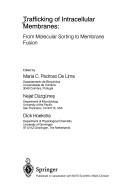
ISBN: 3540589155 3642795498 3642795471 Year: 1995 Volume: 91 Publisher: Berlin Springer
Abstract | Keywords | Export | Availability | Bookmark
 Loading...
Loading...Choose an application
- Reference Manager
- EndNote
- RefWorks (Direct export to RefWorks)
Molecular biology --- Biomembranes --- Cell membranes --- Congresses --- Membrane proteins --- Membrane lipids --- Biological transport

ISBN: 1281039551 9786611039554 008053614X 1559389834 Year: 1995 Publisher: Greenwich, Conn. : JAI,
Abstract | Keywords | Export | Availability | Bookmark
 Loading...
Loading...Choose an application
- Reference Manager
- EndNote
- RefWorks (Direct export to RefWorks)
Membrane Protein Transport, Volume 2
Carrier proteins. --- Biological transport. --- Membrane proteins. --- Membranes (Biology) --- Proteins --- Membrane transport --- Passive transport, Biological --- Physiological transport --- Transport, Biological --- Diffusion --- Osmosis --- Binding proteins --- Transport proteins --- Biological transport --- Protein binding
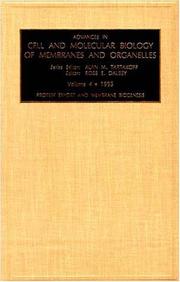
ISBN: 1281060208 9786611060206 0080526098 1559389249 9781559389242 9780080526096 Year: 1995 Publisher: Greenwich, CT : JAI Press,
Abstract | Keywords | Export | Availability | Bookmark
 Loading...
Loading...Choose an application
- Reference Manager
- EndNote
- RefWorks (Direct export to RefWorks)
The incentive for putting together Volume 4 of this series was to review the wealth of new information that has become available in prokaryotic organisms in protein export and membrane biogenesis. Just in the last several years, protein translocation has now been efficiently reconstituted using defined components and the mechanism by which proteins are moved across membrane bilayers is now being examined at a higher resolution. In addition, because of a new technical breakthrough using osmolytes, it is now possible to reconstitute a number of channel proteins, ATPase, receptors, and transporte
Cell membranes --- Membranes (Biology) --- Membrane proteins --- Formation. --- Fluidity. --- Physiological transport. --- Proteins --- Fluidity of biological membranes --- Membrane fluidity (Biology) --- Assembly of cell membranes --- Biogenesis of cell membranes --- Formation of cell membranes --- Origin of cell membranes --- Mechanical properties --- Assembly --- Biogenesis --- Origin
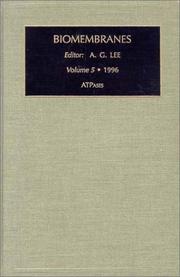
ISBN: 1281186996 9786611186999 0080527701 1559386622 9781559386623 9780080527703 1559386584 9786611060190 1281060194 0080544568 Year: 1995 Publisher: Greenwich, Conn. : JAI Press,
Abstract | Keywords | Export | Availability | Bookmark
 Loading...
Loading...Choose an application
- Reference Manager
- EndNote
- RefWorks (Direct export to RefWorks)
Progress in understanding the nature of the biological membrane has been very rapid over a broad front, but still pockets of ignorance remain. Application of the techniques of molecular biology has provided the sequences of a very large number of membrane proteins, and has led to the discovery of superfamilies of membrane proteins of related structure. In turn, the identification of these superfamilies has led to new ways of thinking about membrane processes. Many of these processes can now be discussed in molecular terms, and unexpected relationships between apparently unrelated phenomena are
Adenosine triphosphatase -- Handbooks, manuals, etc. --- Adenosine triphosphatase -- Pathophysiology -- Handbooks, manuals, etc. --- Adenosine triphosphatase. --- Endocytosis. --- Exocytosis. --- Biology --- Health & Biological Sciences --- Biology - General --- Membranes (Biology). --- Membrane Proteins --- Cell Membrane --- Proteins --- Cellular Structures --- Cells --- Amino Acids, Peptides, and Proteins --- Anatomy --- Chemicals and Drugs --- Anatomies --- Cell --- Cell Biology --- Cell Components --- Cell Component --- Cellular Structure --- Component, Cell --- Components, Cell --- Structure, Cellular --- Structures, Cellular --- Gene Products, Protein --- Gene Proteins --- Protein --- Protein Gene Products --- Proteins, Gene --- Molecular Mechanisms of Pharmacological Action --- Cytoplasmic Membrane --- Plasma Membrane --- Cell Membranes --- Cytoplasmic Membranes --- Membrane, Cell --- Membrane, Cytoplasmic --- Membrane, Plasma --- Membranes, Cell --- Membranes, Cytoplasmic --- Membranes, Plasma --- Plasma Membranes --- Membranes --- Integral Membrane Protein --- Membrane Protein --- Membrane-Associated Proteins --- Cell Membrane Protein --- Cell Membrane Proteins --- Cell Surface Protein --- Cell Surface Proteins --- Integral Membrane Proteins --- Membrane-Associated Protein --- Surface Protein --- Surface Proteins --- Membrane Associated Protein --- Membrane Associated Proteins --- Membrane Protein, Cell --- Membrane Protein, Integral --- Membrane Proteins, Integral --- Protein, Cell Membrane --- Protein, Cell Surface --- Protein, Integral Membrane --- Protein, Membrane --- Protein, Membrane-Associated --- Protein, Surface --- Proteins, Cell Membrane --- Proteins, Cell Surface --- Proteins, Integral Membrane --- Proteins, Membrane --- Proteins, Membrane-Associated --- Proteins, Surface --- Surface Protein, Cell --- Membranes (Biology) --- Biological transport. --- Carrier proteins. --- Membrane proteins.

ISBN: 030644870X 9781441912305 Year: 1995 Publisher: New York, N.Y. Springer Science + Business Media, LLC
Abstract | Keywords | Export | Availability | Bookmark
 Loading...
Loading...Choose an application
- Reference Manager
- EndNote
- RefWorks (Direct export to RefWorks)
Physiology of nerves and sense organs --- Biological Transport. --- Cell Membrane --- Ion Channels. --- Ion channels --- -Channels, Ion --- Biological transport, Active --- Ion-permeable membranes --- Membrane proteins --- Ion Channel --- Ionic Channel --- Ionic Channels --- Membrane Channel --- Membrane Channels --- Channel, Ion --- Channel, Ionic --- Channel, Membrane --- Channels, Ion --- Channels, Ionic --- Channels, Membrane --- Signal Transduction --- Biologic Transport --- Transport, Biological --- Transport, Biologic --- Transport Vesicles --- Membrane Transport Proteins --- physiology. --- Research --- -Methodology --- Methodology. --- -physiology. --- Biological Transport --- Ion Channels --- Research&delete& --- Methodology --- physiology
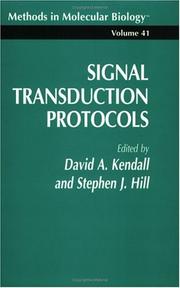
ISBN: 0896032981 9786610836505 1280836504 1592595286 9780896032989 Year: 1995 Volume: 41 Publisher: Totowa, N.J. Humana Press
Abstract | Keywords | Export | Availability | Bookmark
 Loading...
Loading...Choose an application
- Reference Manager
- EndNote
- RefWorks (Direct export to RefWorks)
As our understanding of the biological sciences expands, the boundaries between traditional disciplines tend to blur at the edges. Physiologists and pharmacologists, for instance, now need to embrace techniques that until recently were the strict preserves of biochemists and molecular biologists. However, the acquisition of new technologies can be a time-consuming and frustrating business, and unless an expert is on hand to give instruction, precious hours can be spent poring over half-described Methods sections with no guarantee of eventual success. The aim of Signal Transduction Protocols has been to get experts with "hands-on" experience in particular techniques to give detailed accounts of experimental protocols in a recipe-type format, which we hope will circumvent the problems of ambiguity often encountered when reading the literature. The techniques described in Signal Transduction Protocols are those that we think will be most useful in addressing questions in the area of receptor-mediated cell signaling, with particular regard to those receptors that are part of the G-protein-linked superfamily. To keep it to a manageable size, we have omitted any reference to electrophysiology and have instead concentrated on more biochemical approaches.
Molecular biology --- Cellular signal transduction --- Cell receptors --- G proteins --- Research --- Methodology --- 577.2 --- 547 --- -Cellular signal transduction --- -G proteins --- -#WDIR:vfm2 --- GTP-binding proteins --- GTP regulatory proteins --- Guanine nucleotide-binding proteins --- Guanine nucleotide regulatory proteins --- Membrane proteins --- Cellular information transduction --- Information transduction, Cellular --- Signal transduction, Cellular --- Bioenergetics --- Cellular control mechanisms --- Information theory in biology --- Cell membrane receptors --- Cell surface receptors --- Receptors, Cell --- Binding sites (Biochemistry) --- Cell membranes --- Proteins --- Molecular bases of life. Molecular biology --- Organic chemistry --- -Methodology --- Methodology. --- 547 Organic chemistry --- 577.2 Molecular bases of life. Molecular biology --- #WDIR:vfm2 --- Research&delete& --- Proteids --- Biomolecules --- Polypeptides --- Proteomics --- Cytology. --- Cell Biology. --- Cell biology --- Cellular biology --- Biology --- Cells --- Cytologists --- Cellular signal transduction - Research - Methodology --- Cell receptors - Research - Methodology --- G proteins - Research - Methodology
| Listing 1 - 8 of 8 |
Sort by
|

 Search
Search Feedback
Feedback About UniCat
About UniCat  Help
Help News
News